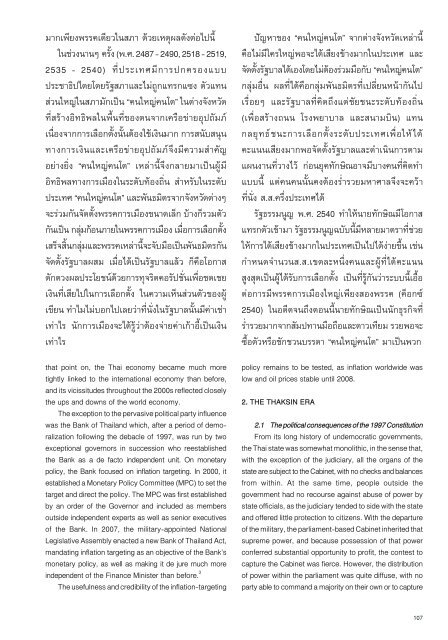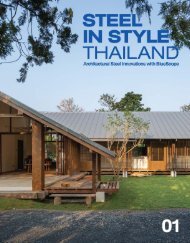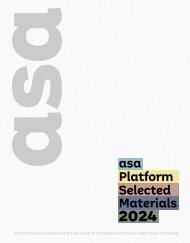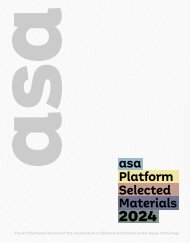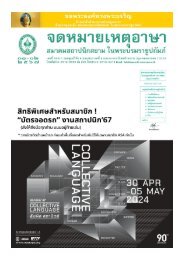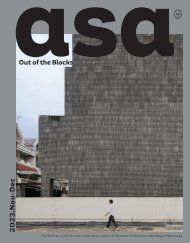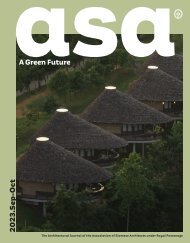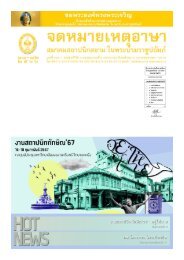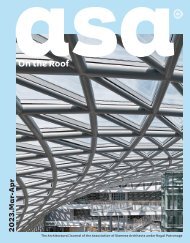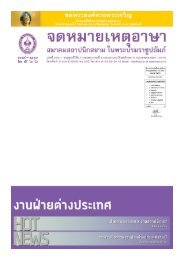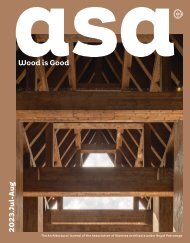บ้านเรือนถิ่นไทยในช่วงเจ็ดทศวรรษ 2489-2559
You also want an ePaper? Increase the reach of your titles
YUMPU automatically turns print PDFs into web optimized ePapers that Google loves.
มากเพียงพรรคเดียวในสภา ด้วยเหตุผลดังต่อไปนี้<br />
ในช่วงนานๆ ครั้ง (พ.ศ. 2487 - 2490, 2518 - 2519,<br />
2535 - 2540) ที่ประเทศมีการปกครองแบบ<br />
ประชาธิปไตยโดยรัฐสภาและไม่ถูกแทรกแซง ตัวแทน<br />
ส่วนใหญ่ในสภามักเป็น “คนใหญ่คนโต” ในต่างจังหวัด<br />
ที่สร้างอิทธิพลในพื้นที่ของตนจากเครือข่ายอุปถัมภ์<br />
เนื่องจากการเลือกตั้งนั้นต้องใช้เงินมาก การสนับสนุน<br />
ทางการเงินและเครือข่ายอุปถัมภ์จึงมีความสำคัญ<br />
อย่างยิ ่ง “คนใหญ่คนโต” เหล่านี้จึงกลายมาเป็นผู้มี<br />
อิทธิพลทางการเมืองในระดับท้องถิ่น สำหรับในระดับ<br />
ประเทศ “คนใหญ่คนโต” และพันธมิตรจากจังหวัดต่างๆ<br />
จะร่วมกันจัดตั้งพรรคการเมืองขนาดเล็ก บ้างก็รวมตัว<br />
กันเป็น กลุ่มก้อนภายในพรรคการเมือง เมื่อการเลือกตั้ง<br />
เสร็จสิ้นกลุ่มและพรรคเหล่านี้จะจับมือเป็นพันธมิตรกัน<br />
จัดตั้งรัฐบาลผสม เมื่อได้เป็นรัฐบาลแล้ว ก็คือโอกาส<br />
ตักตวงผลประโยชน์ด้วยการทุจริตคอรัปชั่นเพื่อชดเชย<br />
เงินที่เสียไปในการเลือกตั้ง ในความเห็นส่วนตัวของผู้<br />
เขียน ทำไมไม่บอกไปเลยว่าที่นั่งในรัฐบาลนั้นมีค่าเช่า<br />
เท่าไร นักการเมืองจะได้รู้ว่าต้องจ่ายค่าเก้าอี้เป็นเงิน<br />
เท่าไร<br />
that point on, the Thai economy became much more<br />
tightly linked to the international economy than before,<br />
and its vicissitudes throughout the 2000s reflected closely<br />
the ups and downs of the world economy.<br />
The exception to the pervasive political party influence<br />
was the Bank of Thailand which, after a period of demoralization<br />
following the debacle of 1997, was run by two<br />
exceptional governors in succession who reestablished<br />
the Bank as a de facto independent unit. On monetary<br />
policy, the Bank focused on inflation targeting. In 2000, it<br />
established a Monetary Policy Committee (MPC) to set the<br />
target and direct the policy. The MPC was first established<br />
by an order of the Governor and included as members<br />
outside independent experts as well as senior executives<br />
of the Bank. In 2007, the military-appointed National<br />
Legislative Assembly enacted a new Bank of Thailand Act,<br />
mandating inflation targeting as an objective of the Bank’s<br />
monetary policy, as well as making it de jure much more<br />
independent of the Finance Minister than before. 3<br />
The usefulness and credibility of the inflation-targeting<br />
ปัญหาของ “คนใหญ่คนโต” จากต่างจังหวัดเหล่านี้<br />
คือไม่มีใครใหญ่พอจะได้เสียงข้างมากในประเทศ และ<br />
จัดตั้งรัฐบาลได้เองโดยไม่ต้องร่วมมือกับ “คนใหญ่คนโต”<br />
กลุ่มอื่น ผลที ่ได้คือกลุ่มพันธมิตรที่เปลี่ยนหน้ากันไป<br />
เรื่อยๆ และรัฐบาลที่คิดถึงแต่ชัยชนะระดับท้องถิ่น<br />
(เพื่อสร้างถนน โรงพยาบาล และสนามบิน) แทน<br />
กลยุทธ์ชนะการเลือกตั้งระดับประเทศเพื่อให้ได้<br />
คะแนนเสียงมากพอจัดตั้งรัฐบาลและดำเนินการตาม<br />
แผนงานที่วางไว้ ก่อนยุคทักษิณอาจมีบางคนที่คิดทำ<br />
แบบนี้ แต่คนคนนั้นคงต้องร่ำรวยมหาศาลจึงจะคว้า<br />
ที่นั่ง ส.ส.ครึ่งประเทศได้<br />
รัฐธรรมนูญ พ.ศ. 2540 ทำให้นายทักษิณมีโอกาส<br />
แทรกตัวเข้ามา รัฐธรรมนูญฉบับนี้มีหลายมาตราที่ช่วย<br />
ให้การได้เสียงข้างมากในประเทศเป็นไปได้ง่ายขึ้น เช่น<br />
กำหนดจำนวนส.ส.เขตละหนึ่งคนและผู้ที่ได้คะแนน<br />
สูงสุดเป็นผู้ได้รับการเลือกตั้ง เป็นที่รู้กันว่าระบบนี้เอื้อ<br />
ต่อการมีพรรคการเมืองใหญ่เพียงสองพรรค (ค็อกซ์<br />
2540) ในอดีตจนถึงตอนนี้นายทักษิณเป็นนักธุรกิจที่<br />
ร่ำรวยมากจากสัมปทานมือถือและดาวเทียม รวยพอจะ<br />
ซื้อตัวหรือชักชวนบรรดา “คนใหญ่คนโต” มาเป็นพวก<br />
policy remains to be tested, as inflation worldwide was<br />
low and oil prices stable until 2008.<br />
2. THE THAKSIN ERA<br />
2.1 The political consequences of the 1997 Constitution<br />
From its long history of undemocratic governments,<br />
the Thai state was somewhat monolithic, in the sense that,<br />
with the exception of the judiciary, all the organs of the<br />
state are subject to the Cabinet, with no checks and balances<br />
from within. At the same time, people outside the<br />
government had no recourse against abuse of power by<br />
state officials, as the judiciary tended to side with the state<br />
and offered little protection to citizens. With the departure<br />
of the military, the parliament-based Cabinet inherited that<br />
supreme power, and because possession of that power<br />
conferred substantial opportunity to profit, the contest to<br />
capture the Cabinet was fierce. However, the distribution<br />
of power within the parliament was quite diffuse, with no<br />
party able to command a majority on their own or to capture<br />
107


